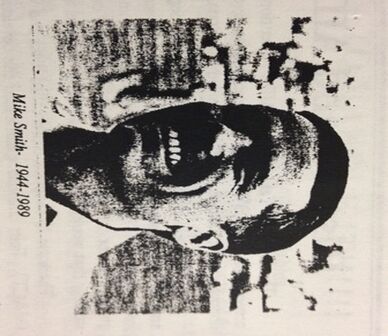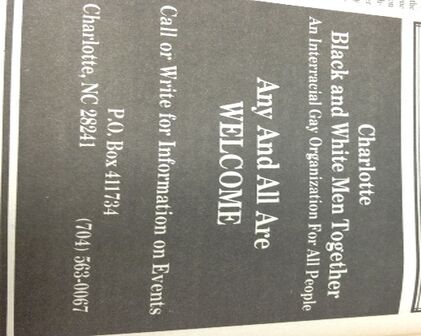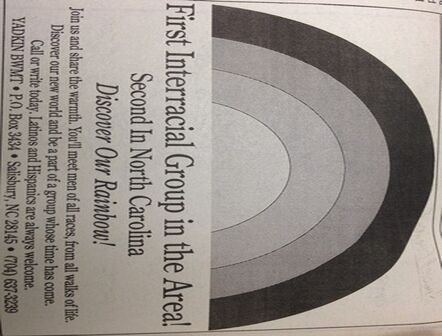Black and White Men Together in North Carolina
This entry is part of: LGBT Identities, Communities, and Resistance in North Carolina, 1945-2012
BWMT in North Carolina
National Organization Background and Formation
Black and White Men Together is an organization founded in San Francisco in 1980 by Michael Smith. Smith admitted to having encountered pervasive racism within communities of gay men in San Francisco and various other cities he had visited - especially in gay businesses like bars and baths. By his own account, “...people of color are routinely denied admission to and/or common courtesy...”[1] in these gay establishments. Beyond that, Smith cited the problem with issues of representation of gay people in the media as racist and exclusionary. Describing himself as having grown up in an environment with no tolerance for prejudice and learning later on in his development to own up to his own racism and challenge it, Smith formed Black and White Men Together. For Smith, “disowning racism [was] like coming out all over again.”[2] A year after founding BWMT in San Francisco, groups around the country with similar concerns began forming as local chapters and affiliates. BWMT-New York formed just after San Francisco in 1980 and after 5 years of existence, they changed their name to Men of All Colors Together (MACT) to reflect an expanded consciousness - however a connection to BWMT was maintained.[3] Just a decade later, by 1990, over 20 chapters existed both nationally and internationally, connected to Black and White Men Together, and three were located in North Carolina - Triangle BWMT, Yadkin BWMT and Charlotte BWMT operating throughout the mid to late eighties and into the nineties.[4]
Purpose and Function
Ascertaining the extent to which BWMT was a social organization or a political one can be difficult. According to Smith, BWMT opened a space for white men who are attracted to Black men to find others like themselves, and it offered Black men an area in which they knew they would not be discriminated against on the basis of their race.[5] However among North Carolina’s chapters at least, BWMT was more than a social organization allowing white men access to men of color - although that did occur. The social element had an inclusive appeal for the Triangle chapter for example, as they demonstrated in an event invite which asserted that, “we of Triangle BWMT are putting on this dance for everyone in the gay community who supports the idea of an organization like ours existing. It’s not just for BWMT members or potential members.”[6] The inclusive nature of Triangle BWMT as an organization became evident when in 1992 it evolved to become Triangle Men of All Colors Together (T-MACT). Their formal statement of purpose indicated:
“We are a gay-affirmative organization committed to working for social justice for gay and bisexual men from diverse ethnic backgrounds. We are committed to celebrating the uniqueness of our different heritages and to fostering supportive environments wherein cultural and racial barriers are overcome and true human equality realized. To this end, we engage in cultural, political, educational, social and community activities as means of combatting the pervaisive racism, sexixm, homophobia and other social inequalities which adversely impact our lives and communities. We have ongoing groups, socials, picnics, guest speakers and outings.”[7]
For Triangle MACT, the emphasis on celebrating the various cultural backgrounds of gay men sometimes bordered on inappropriate or altogether offensive. T-MACT frequently held dinners and socials with “cultural” themes which exoticized some ethnic groups, such as discussions on Native American gay men like, “Are Red Men Red Hot?” and events like“T-MACT goes Geisha”, a dinner in which, “a handsome Japanese chef shall sling his blade before us at our table while he artfully prepares our meal. A sight you’ll surely not want to miss. (Sorry members, no sword swallowing allowed during the performance.)”[8] In events like these, issues of cultural reductionism can be seen as plaguing groups like T-MACT, even though for the members involved, this may have been understood as progressive celebration of cultural difference.
When the Charlotte chapter or BWMT was established in March of 1990, it was with the intent of, “...fostering an environment supportive of those who desire to be in interracial relationships or who would simply like to move in a circle that allows for multiracial social contact. In addition, the group [sought] to encourage an atmosphere in which racial and cultural barriers can be overcome to the betterment of f the gay community and society in general.”[9] The Yadkin BWMT, formed in 1989 described itself as an, “interracial group for men of all races, committed to fostering healthy attitudes among cultures through education, politics and social activities.”[10] However generally speaking, for the men who involved themselves in BWMT in North Carolina, the distinction between social concerns and political concerns was vague because social concerns were political concerns. Their personal lives were politicized by the marginalization they experienced on the basis of race and sexuality.
Activity and Programming
Archives suggest that the Charlotte BWMT may have been slightly more politically oriented chapter than Triangle BWMT was, and later T-MACT became. While BWMT in the Triangle sustained itself largely on social gatherings like potlucks and sports like volleyball (“...of a very gay and interracial sort...”)[11], BWMT Charlotte used social events to do political work. Still the social element of Triangle BWMT was politicized by their involvement in AIDS awareness. One thing all of the North Carolina chapters shared in common was the celebration of their organization’s yearly anniversary in a significant way. Triangle BWMT and Charlotte BWMT both celebrated anniversaries with weekend-long retreats, conferences or vacations. Charlotte’s anniversary weekends generally had an agenda with a more utilitarian function. At Charlotte’s 3rd anniversary in 1993, the National Task Force on AIDS Prevention hosted a seminar called “Living with AIDS” followed s a workshop around the viewing of the film “Before Stonewall” which helped ground the 62 attendees in their shared gay cultural history.[12]
Chapter communication between the North Carolina chapters of BWMT and BWMT of Atlanta was strong.[13] Atlanta was the larger, more dominant chapter of BWMT in the South however their publications regularly featured news from North Carolina, invitations to BWMT anniversary celebrations for North Carolina branches and praise for the accomplishments of BWMT members of North Carolina chapters. This was the case for Brad Caldwell who was integral to the development of BWMT Charlotte and the chapter’s co-chair, when he was selected for appointment to the board of the National Association of Black and White Men Together (NABWMT).[14] BWMT in both the Triangle and Charlotte also encouraged gay leadership development with trainings in the facilitation of what were called Hot, Horny and Healthy Playshops, which taught gay men about AIDS transmission, sexual health, and partner negotiation for safe sex.[15]
Both the Yadkin and the Charlotte chapters of BWMT also encouraged gay men to vote during the 1990 senate elections in North Carolina.[16] While never explicitly backing a candidate, Harvey Gantt proffered himself as an ally of the gay community against Jesse Helms’ conservative agenda. At the same time that these chapters engaged in differential levels of political work - especially surrounding AIDS - they all shared in consistent social interaction through rap sessions discussing topics from, “Why do you attend BWMT, and why do interracial relationships insterest you?”[17] to “Safe Sex: How fun it can be.”[18]
References
- ↑ Michael J. Smith, ed., Black Men/white Men: a Gay Anthology (San Francisco: Prentice Hall, 1999), 167.
- ↑ Michael J. Smith, ed., Black Men/white Men: a Gay Anthology (San Francisco: Prentice Hall, 1999), 171
- ↑ “Our History,” Men of All Colors Together/New York, http://www.mactny.org/ourhistory.html (accessed April 3, 2012).
- ↑ Michael J. Smith Obituary, Triangle Community Works Collection, David M. Rubenstein Rare Book & Manuscript Library, Duke University.
- ↑ Michael J. Smith, ed., Black Men/white Men: a Gay Anthology (San Francisco: Prentice Hall, 1999), 170.
- ↑ Triangle BWMT Newsletter October 1989, Triangle Community Works Collection Box 5, David M. Rubenstein Rare Book & Manuscript Library, Duke University.
- ↑ Triangle Men of All Colors Membership Application, Triangle Community Works Collection Box 5, David M. Rubenstein Rare Book & Manuscript Library, Duke University.
- ↑ Triangle Men of All Colors Newsletter February/March 1992, Triangle Community Works Collection Box 5, David M. Rubenstein Rare Book & Manuscript Library, Duke University.
- ↑ March 1990 Q-Notes, Women’s and LGBT Movements Periodicals Collection, Box 21, David M. Rubenstein Rare Book & Manuscript Library, Duke University.
- ↑ Q-Notes, Women’s and LGBT Movements Periodicals Collection Box 21, David M. Rubenstein Rare Book & Manuscript Library, Duke University.
- ↑ Triangle Black and White Men Together Newsletter October 1989, Triangle Community Works Collection Box 5, David M. Rubenstein Rare Book & Manuscript Library, Duke University.
- ↑ Atlanta Black and White Men Together Newsletter March 1993, Atlanta Feminist Lesbian Alliance Collection Box 15, David M. Rubenstein Rare Book & Manuscript Library, Duke University.
- ↑ Atlanta Black and White Men Together Newsletter, Atlanta Feminist Lesbian Alliance Collection Box 15, David M. Rubenstein Rare Book & Manuscript Library, Duke University.
- ↑ Atlanta Black and White Men Together Newsletter August 1992, Atlanta Feminist Lesbian Alliance Collection Box 15, David M. Rubenstein Rare Book & Manuscript Library, Duke University.
- ↑ Atlanta Black and White Men Together Newsletter March 1989, Atlanta Feminist Lesbian Alliance Collection Box 15, David M. Rubenstein Rare Book & Manuscript Library, Duke University.
- ↑ Q-Notes November 1990, Women’s and LGBT Movements Periodicals Collection Box 21, David M. Rubenstein Rare Book & Manuscript Library, Duke University.
- ↑ Q-Notes September 1990, Women’s and LGBT Movements Periodicals Collection Box 21, David M. Rubenstein Rare Book & Manuscript Library, Duke University.
- ↑ Triangle Men of All Colors Newsletter February/March 1992, Triangle Community Works Collection Box 5, David M. Rubenstein Rare Book & Manuscript Library, Duke University.


